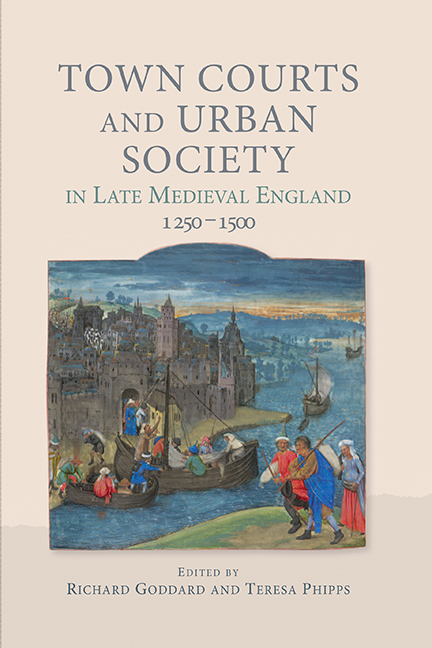Book contents
- Frontmatter
- CONTENTS
- List of Illustrations
- Contributors
- Acknowledgements
- List of Abbreviations
- Introduction
- Jane Laughton: In Memoriam
- 1 Town Courts in Medieval England: An Introduction
- 2 Borough Court Cases as Legal Precedent in English Town Custumals
- 3 The Priest of Nottingham and the Holy Household of Ousegate: Telling Tales in Court
- 4 Female Litigants and the Borough Court: Status and Strategy in the Case of Agnes Halum of Nottingham
- 5 Courts and Urbanisation: Jurisdiction in Late Medieval Seigneurial Boroughs and Towns
- 6 The Business of the Leet Courts in Medieval Norwich, 1288–1391
- 7 The Black Death and the Borough Court: The Changing Pattern of Social and Judicial Representation in Late Medieval Lincoln
- 8 Justice and Jurisdictions in Late Medieval Chester
- 9 Trust: Business Networks and the Borough Court
- 10 Society, Status and the Leet Court in Margery Kempe's Lynn
- Appendix: An Annotated List of Printed or Online Transcriptions and Translations of Medieval Town Courts in Britain to 1500
- Bibliography
- Index
4 - Female Litigants and the Borough Court: Status and Strategy in the Case of Agnes Halum of Nottingham
Published online by Cambridge University Press: 14 September 2019
- Frontmatter
- CONTENTS
- List of Illustrations
- Contributors
- Acknowledgements
- List of Abbreviations
- Introduction
- Jane Laughton: In Memoriam
- 1 Town Courts in Medieval England: An Introduction
- 2 Borough Court Cases as Legal Precedent in English Town Custumals
- 3 The Priest of Nottingham and the Holy Household of Ousegate: Telling Tales in Court
- 4 Female Litigants and the Borough Court: Status and Strategy in the Case of Agnes Halum of Nottingham
- 5 Courts and Urbanisation: Jurisdiction in Late Medieval Seigneurial Boroughs and Towns
- 6 The Business of the Leet Courts in Medieval Norwich, 1288–1391
- 7 The Black Death and the Borough Court: The Changing Pattern of Social and Judicial Representation in Late Medieval Lincoln
- 8 Justice and Jurisdictions in Late Medieval Chester
- 9 Trust: Business Networks and the Borough Court
- 10 Society, Status and the Leet Court in Margery Kempe's Lynn
- Appendix: An Annotated List of Printed or Online Transcriptions and Translations of Medieval Town Courts in Britain to 1500
- Bibliography
- Index
Summary
Agnes Halum lived in Nottingham at the end of the fourteenth century. She was a businesswoman of middling status, just one of hundreds of individuals who lived, worked and traded in the town and used its borough court to resolve interpersonal complaints and disputes. There are many things we cannot know about her, as is true of many other ordinary medieval women: we do not know her age nor when she was born or died, her precise social status or level of wealth, what family she had, where she lived, whether she was an immigrant or born in Nottingham. However, we do know that she was a rather litigious person, and her frequent court appearances help to create a detailed profile of other aspects of her life. Through tracing her legal action over several decades, we can identify many of the individuals she traded with, the goods and services she bought and sold, and the scale at which she operated, creating a picture of her work and commercial life. We can also glimpse some of her personal and social connections and interactions. This does not make her an unusual or singular woman, though the extent to which her life can be reconstructed or reimagined using the town's court records is somewhat more exceptional.
This chapter focuses on the experience of the female litigant in the borough court at the micro level, examining the legal ‘life’ or ‘career’ of Agnes Halum in Nottingham during the late fourteenth century. This approach, which Amy Stanley has recently termed archival ‘excavation’, allows us to recover the lives of ordinary, individual women like Agnes within their own social and economic landscapes, highlighting individual choices, actions and identities, and paying attention to agency. Through these details, we can situate individuals within the broader narratives of urban and legal history that often obscure or ignore the histories of relatively unimportant people, particularly women. This type of analysis does not always yield complete, factual answers or uninterrupted biographies, necessitating some interpretation on the part of the historian, but the value of this approach extends beyond the potential for storytelling that comes with such a specific focus. Individual case studies allow for the ‘peopling’ of medieval legal systems, moving beyond abstract discussions of jurisdiction or custom to examine practice at the most personal level.
- Type
- Chapter
- Information
- Publisher: Boydell & BrewerPrint publication year: 2019

